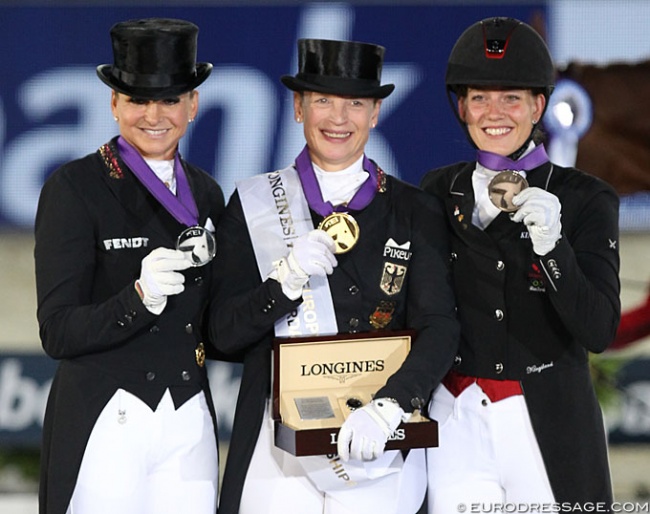
Time after time, German queen of dressage Isabell Werth demonstrates that she has battle leaderhip. At the 2019 European Dressage Championships in Rotterdam, The Netherlands, she proved it again and captured her 19th European gold medal in her career by winning the Grand Prix Special on Bella Rose.
However this time, the victory was not so clear and unanimous. Dorothee Schneider has come back kid Showtime in the form of his life and gave werth a real run for her money (12,000 euro purse). Schneider earned her first individual Grand Prix medal in her career with one percentage point less, while Cathrine Dufour stole the hearts of the crowds with the most aesthetic ride of all and got the bronze.
Bella Rose Has Poise
Isabell Werth is the most amazing rider! Like the Greek sculptor Phidias, she patiently chisels at her horses and brings out a better form, a new shape, an improved condition. Her skill, expertise and finesse are unparalleled and there is no question about it that she is the world's best competition dressage rider.
Although at an Olympic stage her first and only individual gold dates back to 1996 (on Gigolo in Atlanta), after which Anky beat her three times to the punch in 2000, 2004, and 2008, there is not a single rider on the planet with a bigger medal haul than her and on so many different horses! Come to think of it, maybe winning Olympic silver at four Games on three different horses is the bigger accomplishment (1992, 2000, 2008 and 2016)?
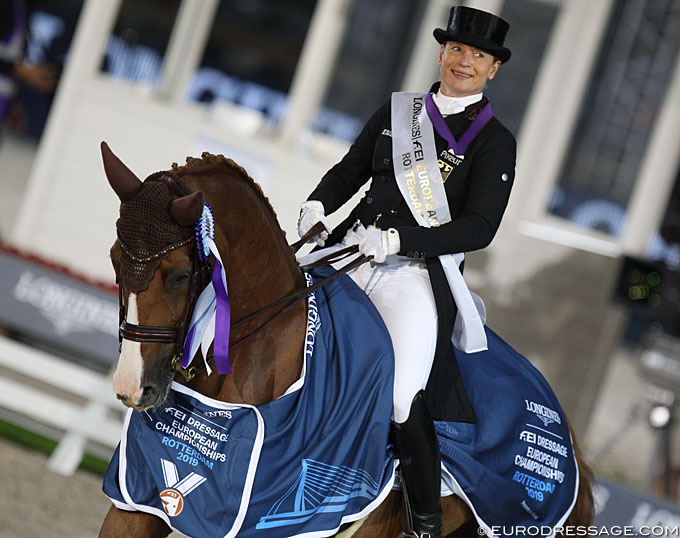
In the Grand Prix Special, Madeleine Winter-Schulze's 15-year old Westfalian mare Bella Rose (by Belissimo M x Cacir AA) was ridden in an even better frame with a longer neck, the poll as highest point in the first part of the test, but the canter work got unbalanced. The tall chestnut mare is definitely a leg mover and hollows the back. Still she got poise. The pair began with lovely trot half passes to the left, in which the mare has massive shoulder freedom in front, but looked a bit fragile in the rhythm behind. The passage was elegant, off the ground, but the hind legs never really moved under the body. The extended walk was lacklustre with one hoof overstep and barely a V-moment, but the collected was very well ridden so the entry into the piaffe went smoothly and Bella Rose finally lowered the haunches. The transition to passage went smoothly but in the second piaffe she did not lower the croup and stayed horizontal despite an immaculate rhythm. The strike off to canter did not happen on the aids but Werth waited patiently for her mare to get the cue. The canter work was fairly unbalanced and in between movements, the mare rocked in the canter strides, dropping on the forehand. Especially in the canter half passes this was obvious and it required Werth to collect the mare even more, making the ones to the left short as well as the flying change at the end. The two tempi changes were very well ridden, the ones lacked total ground covered and were already finished 5 meters after X on the diagonal! The extended canter was uphill. In the pirouette left she rocked in each stride, the ones were expressive but short and in the right pirouette the mare did not take the weight on the hindquarters. Isabell rode all the canter movements faultfree and the mare has plenty of expression to boot, which explains the high marks, but we are taking about pointing mistakes on the highest level which are seen through pink glasses by the judges.
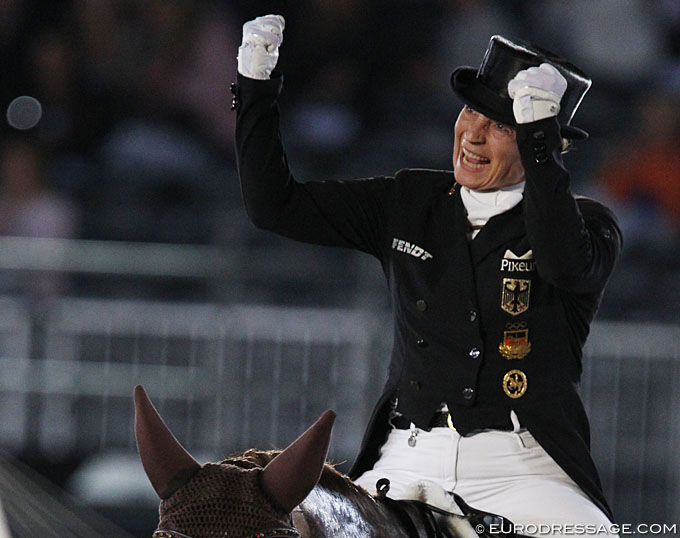
"This is so amazing," said Werth at the press conference. "We are all thrilled and full of emotion. When I went into the 10-minute ring I asked Monica (Theodorescu) Dorothee's score. 85%. Phew that's difficult now. Today the piaffe-passage couldn't be better. The feeling was so outstanding."
The atmosphere in the Rotterdam stadium by dark with the floodlights shining on the last competitors gave the competition a special vibe. "The atmosphere was fantastic. You hear the whispers and the aaahs when I got into the canter. It is so great to win on the last centerline and catch the last points." The 50-year old Werth, who did her first Europeans exactly thirty years ago, still has a fire burning. "We are old women and she pushed me," Werth said about her team mate and silver medal winning Schneider.
Dorothee Schneider and Showtime Closing In
Dorothee Schneider and Gabriele Kippert's 13-year old Hanoverian gelding Showtime (by Sandro Hit x Rotspon) are closing in on Werth. After a long two year break due to injury, Showtime returned to the arena in 2018. Already in Aachen the pair should have won two out of three times and here in Rotterdam they are breathing down Isabell's neck.
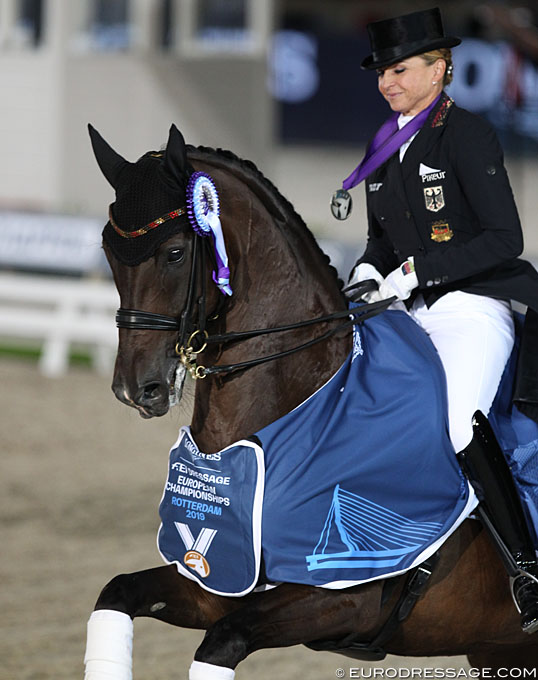
Dorothee and Showtime began with a big trot extensions and sweeping half passes. The passage was springy but the hindlegs could have moved a bit more under the body, especially in the passage on the right lead. Showtime seemed a bit impressed by the arena in floodlight and had looking eyes. The extended walk had much overtrack but could have been a bit more relaxed. In the first piaffe the gelding made an effort to sit and come off the shoulders. The second piaffe was rhythmical but not super bouncy. In the canter work Schneider laboured on the tempi changes. The two's were clear but one was a bit shorter. The ones became very short and there was an issue with them on the diagonal. The left pirouette was counter bent, followed by nine more short one tempi changes, the right pirouette was the better one. The final centerline was fantastic in energy and airtime.
Schneider scored 85.456% and ranked second with five judges and first with two. Nonetheless the ground jury was divided with Eisenhardt having her on 82.021£ and Judet on 88.511%.
"This is the greatest day in my life," Schneider gushed. "I am second and that is amazing. It's my first individual medal in my life (at Grand Prix level). He was flying over the ground. I'm enjoying this step by step." When asked how she lost her points in the tempi changes, Schneider joked, "I lost my stirrup and made a mistake in the ones. I have to speak with Monica to go back on the lunge line."
Will Schneider every beat Isabell? "Maybe in the future I'll have a change. It's the form of the day."
Dressage Pure from Cathrine Dufour
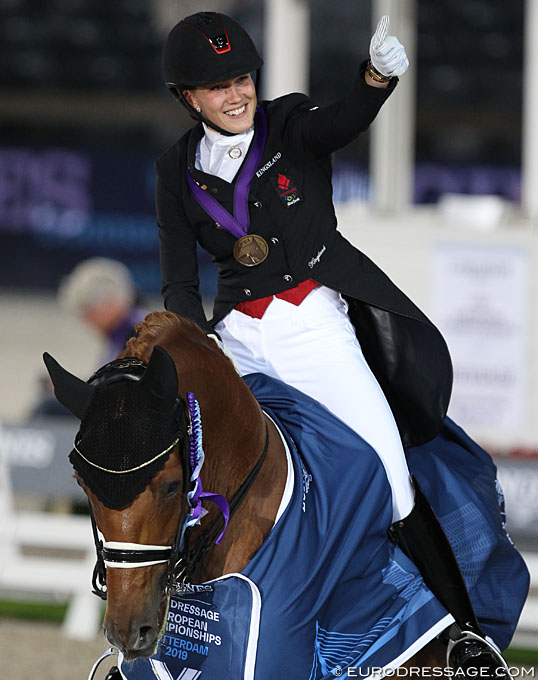
Dufour and the 16-year old Atterupgaards Cassidy (by Caprimond x Donnerhall) came back this year on full form. The horse has exceeded Dufour's wildest expectations. Originally purchased to be her junior rider's horse almost ten years ago, he went on to bring her to Young Riders, Under 25 and senior Grand Prix, and then even further: on the podium. Dufour's one of the most talented dressage riders in the world. Her feeling for timing and softness in riding are unmatched. This was already a given in her junior rider's day and she went on to become the 2012 and 2013 European Young Rider Champion. She made her senior GP team debut at the 2016 Olympic Games in Rio, where they were 12th in the Special and 13th in the Kur. One year later at the 2017 Euros they surged to a double third place in the individual rounds.
And like red wine, the pair is getting better with age. The funky, compact chestnut does not have the most ground covering gaits but he represents everything that dressage stands for: improving your horse through gymnastics. In the Rotterdam Grand Prix Special, Dufour displayed mega riding! They began with a beautiful entry, in which Dufour takes her time for an elegant salute while Cassidy patiently waits in an immobile halt. The trot extensions are big with the nose out and poll up, the transitions to and from passage fluent. The passage itself is better than in the Grand Prix, mainly because Cassidy is helped by the kickboards for better balance. He swings less in the hindquarters in passage on the track.
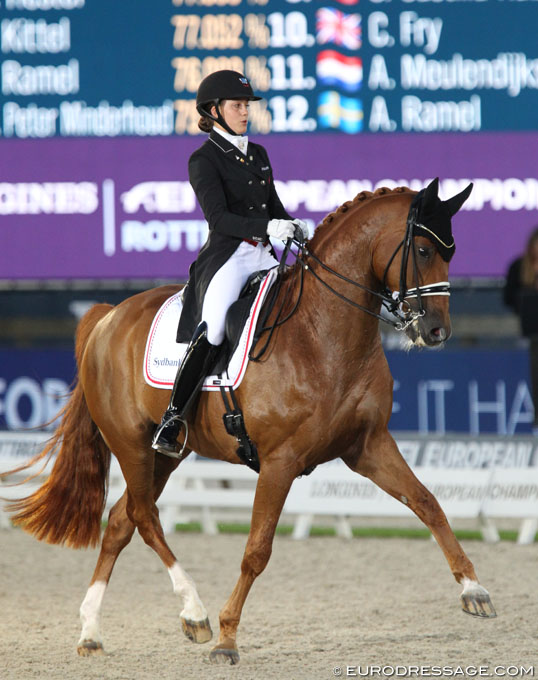
One could probably say that Dufour had the most aesthetic ride of all and if not horse quality but riding was judged, she was the clear gold medal winner! She scored 81.337% for third place and bronze. Her individual marks wen from 78.830% to 83.298%. Six judges had her third, one fourth.
"To score a persona best at 16 years old. He did everything today," said a thrilled Dufour. "In the Grand Prix I was unlucky to have a little bit of rain (it pourted) and it was slippery. I didn't expect to win any medal. My groom had already unplaited him!"
When asked how Dufour prepared for Rotterdam, she replied, "he competed in Aachen and was fourth. Then we did some jogging and chilling and picked him up last week to find the buttons. In the 10-minute ring he told me, 'mommy we are doing this'. He's cute, he's a pony."
Dalera Shines, Cosmo Could Not Find His Sparkle
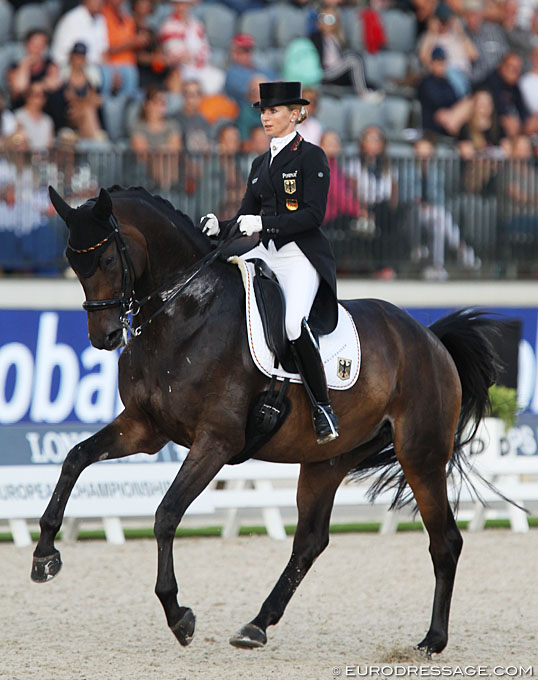
Von Bredow-Werndl and Beatrice Burchler-Keller's 12-year old Trakehner mare Dalera BB (by Easy Game x Handryk) produced a very strong test with massive overtrack and suspension in the trot extensions and passage that was regular and off the ground. There much ease and lightness in the passage - extended trot tour, but the nose of the mare could have been a bit more out. The collected walk was quick and uncollected and there was one canter stride in the passage between the two piaffes, which were on the spot by leaning on the shoulders. The strike off to canter was lovely and the canter half passes very well ridden, as the mare lost here balanced a bit in the right one, but Werndl kept her together. In the tempi changes the mare stays croup high, and there was a hiccup in the ones. On the final centerline, Werndl had a nice rhythm going. They scored 78.541% for a fourth place with scores between 76.915% and 79.787%
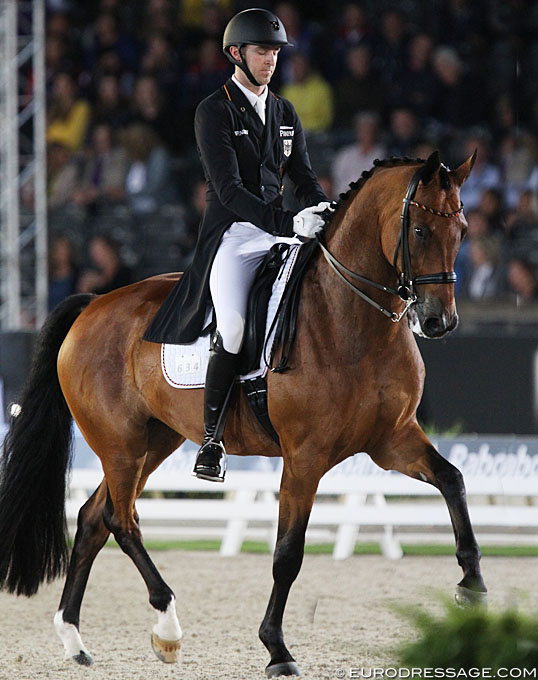
At the 2017 European Championships in Gothenburg, Rothenberger won double individual silver. At the 2018 WEG in Tryon he was just off the podium in fourth place, and in Rotterdam he dropped to sixth place with still 78.116%. Their marks went from 77.021% to 80.213%. Rothenberger's fantastic music will have to go back in the drawer and hopefully it will come out again for the 2020 Tokyo Olympics.
Riding the Green Wave
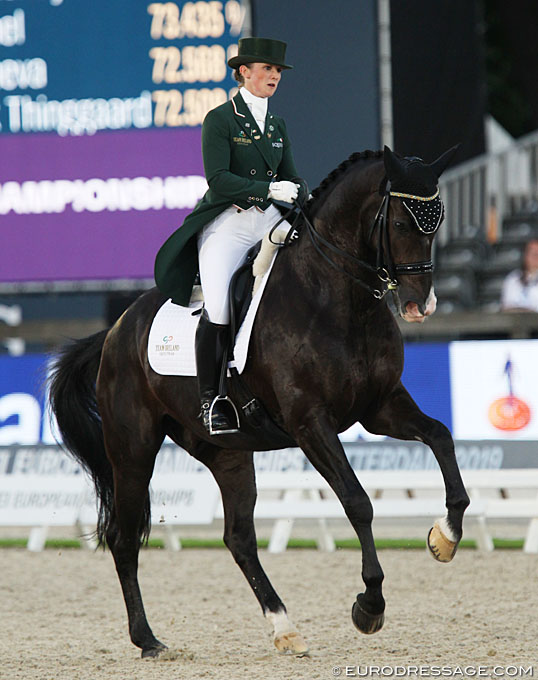
In the Grand Prix Special the pair rode a smooth passage-extended trot tour. The piaffes were tense but on the spot, the two tempi changes straight in the body, the ones nice. In the extended canter the black got quick in the tempo, but the pirouettes were small with good sit on the hindquarters. The right pirouette could have had more bending.
Reynolds posted a personal best of 78.252% and placed fifth.
Hughes Gives Great Britain Some Redemption
Charlotte Dujardin's elimination from the Grand Prix under the blood rule sent a shock wave through the dressage camp at the Europeans in Rotterdam. Unfortunately one of the clear medal favourites was ruled out of the competition. The backlash on social media because of the elimination was nothing short of ridiculous. Britain's prima ballerina Dujardin told Horse and Hound that this first set back in her dressage career and in particular the reactions to it on social media were enough for her to give up competition sport.
"I have never cried so much as that night - I think I cried myself to sleep," Charlotte told Horse and Hound. "I never usually read social media but I did and I was heartbroken by the comments - they broke me and I felt like giving up if I'm honest. I don't feel I rode in any way, shape or form to ever intentionally give her a mark. All night I kept thinking where or how it might have happened. But I have been overwhelmed by the support I've had too, from riders, supporters, judges from all over the world. Things like this make you realise who your true friends are. Now I have to move on and keep my head held high. It's gutting not to be able to ride the Special tonight and the freestyle, but all I can do now is support Carl and the others - and I will."
Dujardin's mentor Carl Hester and his other student Gareth Hughes saved britain's biscuit in the Special and provided redemption for the country which is known for its excellent horsemanship. The best Brit in the Grand Prix Special was Gareth Hughes on the 13-year old KWPN mare Briolinca (by Trento B x Royal Dance). They placed seventh.
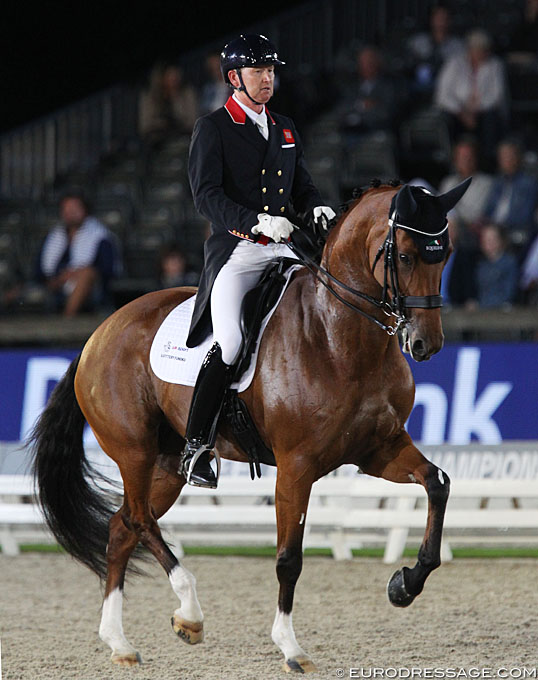
Team mate Carl Hester and the 11-year old British Hanoverian Hawtins Delicato (by Diamond Hit x Regazzoni) placed 9th on 77.508%. Delicato floated in passage, the extended walked had two hooves overstep and a good V-moment in the rhythm. The piaffes were nice, with good lowering of the haunches although Delicato does not have the biggest lift in front. The two tempi changes were super straight, but there was a mistake in the ones. Overall it was a very consistent test.
Text and Photos © Astrid Appels - NO REPRODUCTION ALLOWED
Eurodressage was on the scene photographing all dressage riders in Rotterdam. If you are interested in photos for print or social media, send us an email.
Related Link
Eurodressage coverage of the 2019 European Dressage Championships